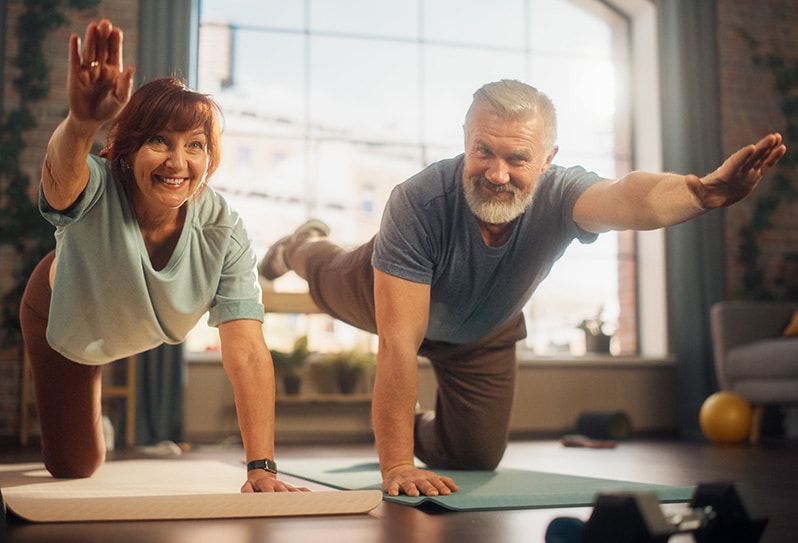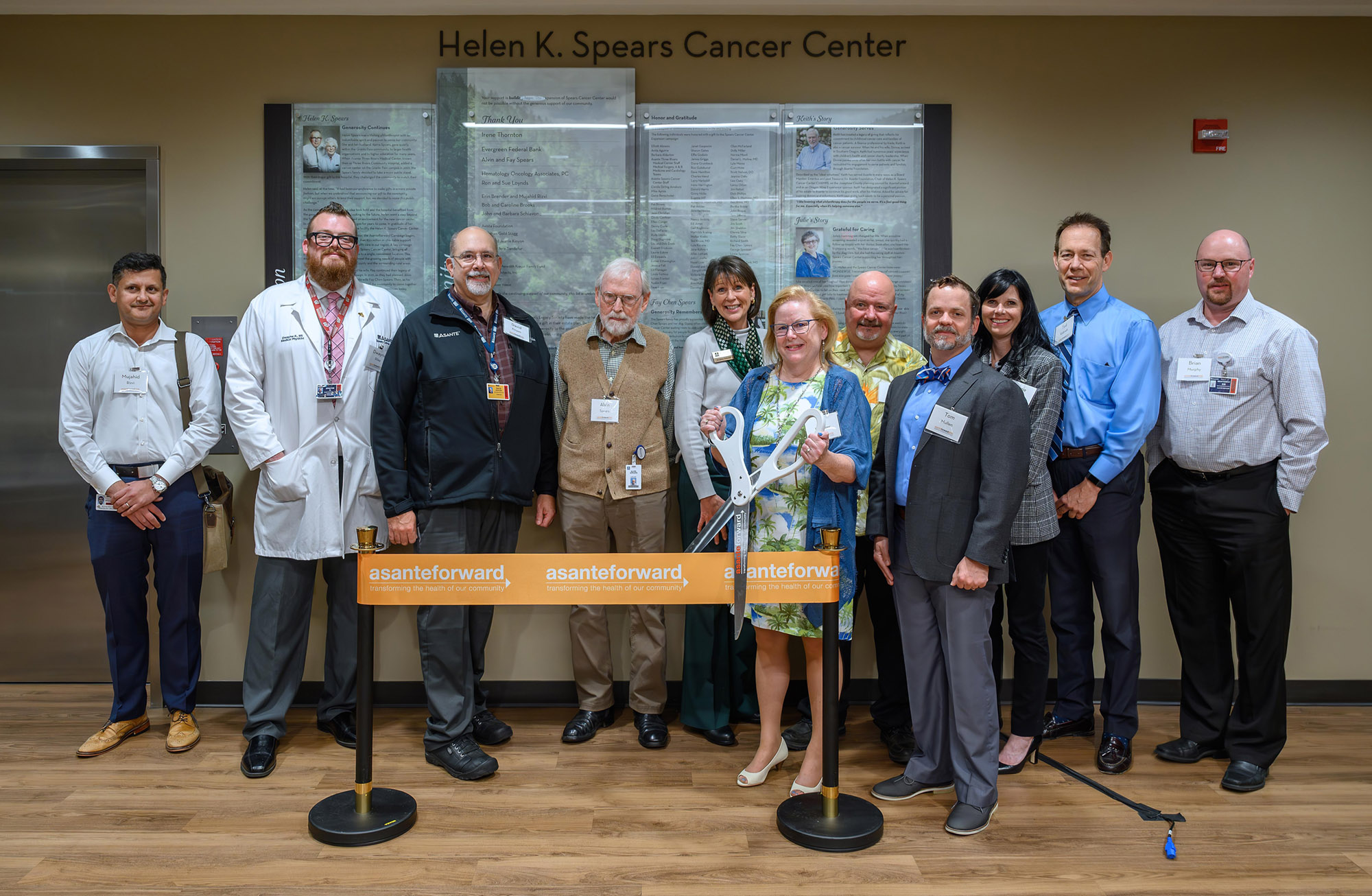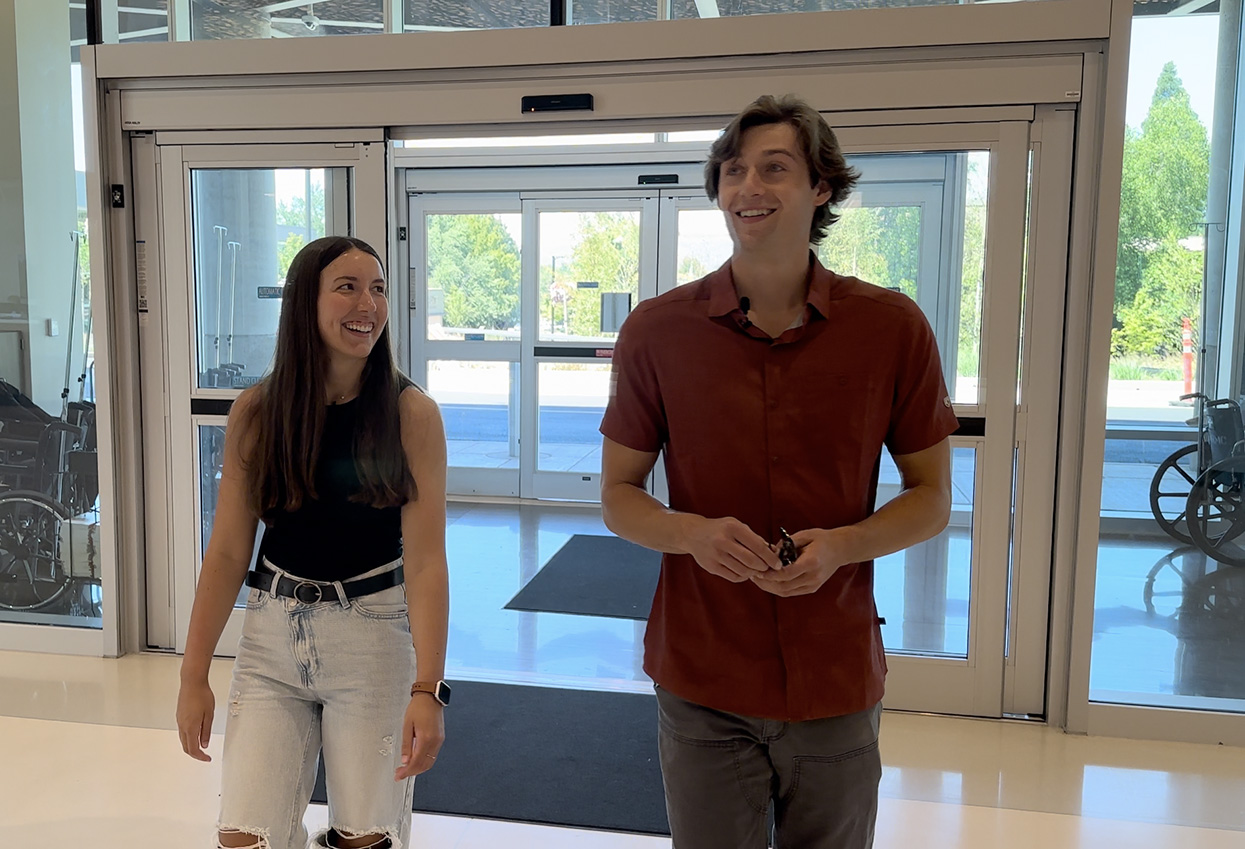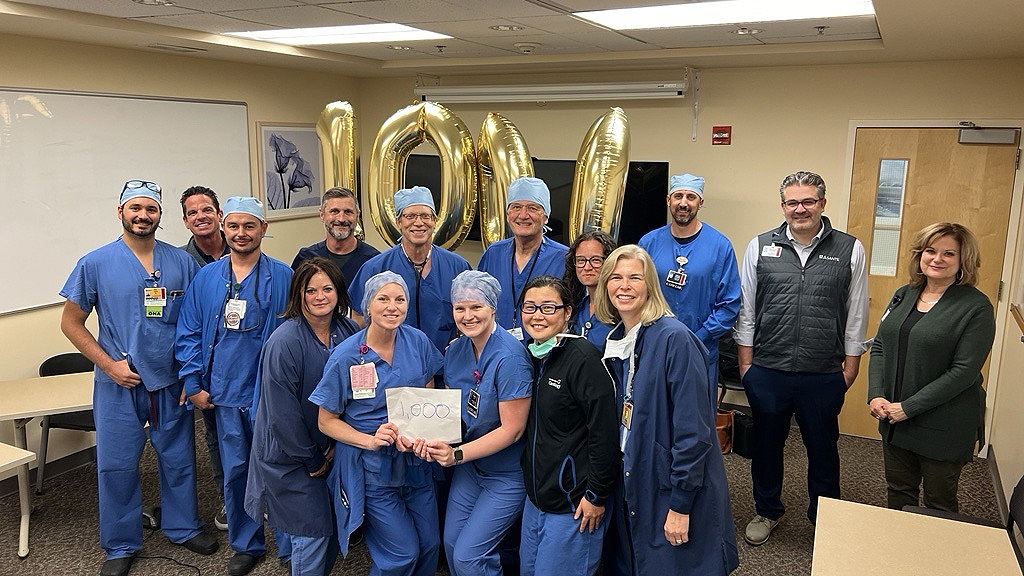Summary
In this episode, Alisia Cook touches on motivation's core, the value of recognizing one's 'why' and celebrates incremental victories. Cook promotes sustainable habits, urging manageable daily fitness commitments.
Introduction
Welcome to ‘Unlock Movement with Asante,’ a micro-podcast series designed to inspire and motivate you to make movement an intrinsic part of your daily life.
We’ve all dreamt of achieving certain milestones in our fitness journey. But have you ever paused to delve into the very essence of these aspirations? What does achieving your goal signify beyond the numbers on the scale or the size tag on a piece of clothing?
In today’s episode, Alisia Cook challenges us to reimagine our fitness objectives, urging us to look beyond the physical and embrace the transformative power of self-awareness and visualization. By the end of this episode, you might see your goals and yourself in a new light.
So, wherever you’re reading this — be it during a quick break at work, lounging at home or waiting in line — take a moment to reflect. Perhaps, even close your eyes for a brief second. Join us on this introspective journey. Let’s dive in.
Subscribe
Unlock Movement with Asante: Episode 3 Now Available. Pivot towards sustainable progress with Health and Wellness coach Alisia Cook. Missed Episode 1? Catch up now. Be sure to Subscribe.
Tessa Hulse
Hello, I’m Tessa Hulse.
Valencia Rollins
And I’m Valencia Rollins.
Tessa Hulse
Welcoming you to unlock movement with Asante.
Valencia Rollins
We’re on a mission to help you transition from a sedentary lifestyle to one more vibrant and full of movement.
Tessa Hulse
Whether you’re considering your first steps toward an active lifestyle or you’re looking for an extra spark of motivation, we’ve got you covered with tips, advice and inspiring conversations with healthcare professionals.
Valencia Rollins
Today, we’re excited to host wellness coach Alisia Cook.
Tessa Hulse
Alisia is going to help us explore the power of habits in our daily lives, especially when it comes to maintaining consistent movement.
Valencia Rollins
We’ll also discuss common challenges in starting a fitness routine and learn strategies for overcoming them.
Tessa Hulse
We’ll delve into setting achievable fitness goals, tracking our progress and finding that intrinsic motivation to stay on track.
Valencia Rollins
Intrigued about transforming your life through movement?
Tessa Hulse
Then let’s dive in.
Valencia Rollins
Welcome, Alisia. Thank you again for joining us today for our discussion around mindful movement. So, let’s talk to our listeners more about the science of habits. Can you give us a brief overview of the science behind habits? Let’s say specifically, can you shed light on the que, routine, reward model and highlighting what role repetition plays in reinforcing habits?
Alisia Cook
So, I guess let’s take this kind of like in a negative flip on things. I mean, right now the whole conversation is around fitness and healthy and mindset motivation. But the best way to kind of give our listeners a good idea of what queue routine reward is, which is technically three components to a successful habit loop. Let’s take tobacco smoking, for instance. Okay, you’re going through chronic stress, you’re having a bad day and you’re queued to go outside to have a cigarette. You smoke that cigarette and at the end of that cigarette feeling, you get that dopamine response of, I’m finally calm and I feel better. Yes, that’s negative. But what if we flip that switch? What if we take the que, routine, reward and we’re like, I’m chronically stressed, I’m having a bad day, I think I should go outside and smoke a cigarette, but I want to break this cycle. Maybe I should take that time, that ten-minute break that I would go outside to smoke my cigarette, to go for a ten-minute walk instead and see if that makes me feel just as good. So that could start the reward of something better, more healthier habits.
Alisia Cook
But there’s different ways you can look at that. But basically, it’s a cued behavior triggered by a routine and then you start to create that reward mechanism.
Valencia Rollins
So, it sounds like we want to replace our less healthy or our bad habit with one that’s more healthier or more towards that movement that we want to get started into our everyday lives. Thank you so much for explaining that. Let’s talk more about crafting these healthy habits now. Can you walk us through a practical approach to crafting healthy habits, particularly related.
Alisia Cook
To exercise at the end of the day when you’re crafting realistic expectations of yourselves and trying to develop a routine towards better health and wellness because of fitness. Don’t overthink it. That’s the first thing I would tell someone. Don’t overthink it. Don’t overanalyze it. Just get moving. Also, don’t think that you have to spend hours upon hours moving in order to get the rewards that you’re hoping to get. You need to start small and small and sustainable. Otherwise, you’re just going to create unrealistic expectations of yourself and in the end, you’re going to give up on your goals. So small, start with five to ten minutes. Don’t overthink it and just get moving. And if that doesn’t work well, phone a friend. Find podcast if you’re intrigued by self-help stuff, exercises that try to encourage you to get motivated or get back on track. Find a podcast or an Audible book and encourage yourself to get out and get moving for five to ten minutes just through a chapter or a single podcast because then it’s fun and encouraging and motivating. But those are probably the best things I would tell someone who’s trying to get back on track.
Alisia Cook
Again, don’t overthink it’s. The biggest one.
Valencia Rollins
Absolutely. I think then when they get into that overthinking, they decide to give up. And that’s really about, like you said, just doing it. It’s not about being perfect or it’s just starting right where you’re at. Get moving like you said. Find something that you like, or you love to do and follow through with it and start celebrating those small successes. Very good. So, let’s talk to our listeners about setting and tracking their fitness goals. Intrinsic motivation is an important factor when finding the motivation to get moving. How can our listeners identify what motivates them and use that to establish and achieve their fitness goals?
Alisia Cook
Motivation. This has got to be one of my probably favorite conversations. This might not sit well with some of the listeners and some of the listeners just might have an “aha moment” on why they’re still sitting on the couch. So, newsflash people, if you’re waiting to be motivated to get up and get moving, guess what? You’re still going to be sitting on the couch waiting to be motivated. You cannot wait to get moving because you’re waiting to get motivated. You need to create that intrinsic feeling of I’m motivated, I’m ready to make these changes. How do you do that? By setting up purpose. Purpose comes from why. Why am I doing this in the first place? So, if I continue on the path that I’m sitting on right now, which is I’m not moving, well, gosh, if you mindfully. Shut your mind and you start to process and ponder what I’m going to feel like and look like a week from now, three months from now, five years from now, you’re going to realize, gosh, if I stay on this path, I’m not going to be very healthy. But if you flip the switch and create your why?
Alisia Cook
Because you’ve closed your eyes and thought about, gosh, if I got up and I got moving for the next week, the next three months, the next year, gosh, what would I look like? What would I feel like? You need to create that feeling within in order to get yourself up off the couch. Otherwise, motivation never going to happen. And the best way to stay motivated once you are in track because you started to create those small sustainable steps that’s looking for those things, those small non scale victory wins. If you can find non scale victory wins, then you’re going to continue to win things like, gosh, I feel like I’ve got more energy today. Wow, I slept better. Gosh, I don’t feel like I’m going to bite anyone’s head off because I feel like I’m getting endorphins from getting out and moving or my clothes fit better, or someone complimented me about the fact that I look like I’ve lost weight. Those are non-scale victories and those 100% are what’s going to keep you motivated once you get the movement going.
Valencia Rollins
All right, let’s talk to our listeners about realistic goals and visualization. Alisia, can you give them some advice on how to set realistic goals and use visualization as a motivational tool? Let’s say our fictitious character, his name is John, and he wants to lose 20 pounds. What does that look like, for instance?
Alisia Cook
Yeah, so kind of taking it back to kind of what I just addressed just a minute ago. If someone’s trying to create a visualization for themselves about what it’s like to lose 20 pounds and this is actually a common thing when people come to me and they want coaching, they’re like, “I want to lose 15 pounds; I want to lose 20 pounds; I want to lose ten pounds.” I sit them down in a chair and I honestly ask them, okay, here’s a piece of paper and a pen and I want you for literally 1 minute to close your eyes. I know it sounds kind of cheesy but close your eyes for a minute. Just close your eyes. I’ll set a timer and, in that minute, I want you to ponder and process what 20 pounds is going to feel like. If you literally got rid of 20 pounds, process that, what would that feel like to you? Is that going to feel like more confidence? Is it going to feel like you have more energy to keep up with those around you? I mean, the sky is the limit, but I want you to close your eyes and process that.
Alisia Cook
Set the timer, have them wake up and then have them write down on a piece of paper exactly what that feels like for them because most people are going to list anywhere from three to five. I’ve actually had someone list ten things on what their weight loss would feel like if they lost it, then I asked them the same question. I want you to close your eyes again for another minute, only this time I want you to visualize what is that 20 pounds going to look like? What is it going to look like? Smaller clothes, skinnier, face? Is it going to give you a different kind of glow? I mean, the sky is the limit. You close your eyes for a minute, I’ll set the timer. Minute goes off, they wake up and I tell them the same thing. Write three to five things. And then at the top of the paper, I have them write how much weight they said they wanted to lose. And then I tell them to keep that same piece of paper in plain sight every day for several months. They kind of look at me like I’m crazy. But here’s the thing.
Alisia Cook
As time goes on, I tell them, every day you wake up and you start to experience something from either one of those lists what that weight loss feels like or looks like. I want you to cross it off. Cross it off one by one and I will almost guarantee you, before you physically have lost 20 pounds on this scale, you’re going to cross all of those items off on your list. So, then I ask you, is it really about the weight loss or is it just about you making big changes and feeling better about yourself?
Valencia Rollins
Go ahead.
Alisia Cook
No, you’re good. Go ahead.
Valencia Rollins
It almost seems like that, can reconnect them to their why as well and keep that before them, like you said posted. It’s like keeping the vision before them. And when they feel like they can’t do it, or they need to reconnect to that vision. Or that why all they got to do is go and revisit that wherever they have it posted whether it’s on their mirror and their car on their phone, like as the wallpaper from their phone or laptop. Great point. Thank you so much.
Alisia Cook
Yeah. Also helps with those habits too. So, if they’re falling short of their habits, it kind of takes it all full circle.
Valencia Rollins
Absolutely. So, let’s talk to our listeners about the small wins and victories because that’s what we’re working towards. How can celebrating small wins and victories help maintain motivation in the long term?
Alisia Cook
So, pulling out that list they just created, as they start to see those items being checked off, they need to embrace the fact that that’s exciting because the more you embrace, oh, my gosh, I feel like I have more confidence. Oh, my gosh, I just did a hike that I never in a million years thought that I could ever do. They need to actually celebrate that, be excited about it. If you want to stay on track with the healthy habits, you need to celebrate those small wins and victories. Otherwise, you’re just going to revert back. And what was the point of starting in the first.
Valencia Rollins
Absolutely. Absolutely. Very good. And that takes us right to our habit stacking portion of the discussion. Alisia, could you unpack the concept of habit stacking for us? And specifically, how can pairing challenging tasks like working out with enjoyable activities such as watching a favorite TV show or listening to a beloved podcast lead to sustainable changes in our lives?
Alisia Cook
So, let’s say, for instance, you do want to be more mindful about being healthy. You could tell yourself, okay, so every single day I’m going to get out and move for ten to 15 minutes. I kind of addressed this earlier, but we’ll take it back around. But I also want to start getting more information about staying motivated. So, researching and looking into a bunch of different podcasts or Audible books and telling yourself, hey, guess what? I’m going to get out every day for 15 minutes and listen to at least one chapter or two of this Audible book so that way I can feel more motivated and encouraged because this book is really good and I want to get to the end. So, someone that’s kind of like going out on their walk, that might feel like today is not a good day, I don’t really want to go for a walk, but man, I really want to get to that next chapter. So that’s the reward, basically, is you’re telling yourself, well, if I don’t get out and I get moving, then I can’t listen to this book because this is what I told myself.
Alisia Cook
I’m only going to listen to this specific book on Audible if I take it outside and go for a walk. So, looking forward to that next chapter will make you look forward to your next workout. Yeah, and that’s kind of like stacking two habits in one and getting pleasure along with fitness at the same time. So, I guess that’s the best way I could kind of explain that.
Valencia Rollins
Absolutely. And still working towards our outcome of weight loss. Yes, absolutely. So, let’s talk to our listeners about actually getting off the couch. For those struggling to find the motivation to start, what’s your advice on how to take that first step?
Alisia Cook
Ask yourself why. Why do you want to get up off the couch? If that why? Is not big enough, bold enough, brave enough, you’re going to keep sitting on the couch? That’s exactly it. There’s no way to sugarcoat it. Ask yourself why. But that’s just it. Take that why and make it be so big and so bold, because if you don’t, life obstacles will keep getting in your way.
Valencia Rollins
Absolutely. Take your why, put it before you, keep it before you and go for your goals. Just doing it don’t have to be perfect, but just working towards your goals a little bit of time each day. Well, very good. In closing, Alisia, I would like to express my deepest gratitude for sharing your time and insights with us today?
Alisia Cook
Well, I’ve been honored to come back again and share my insight. It is always my pleasure. I love helping people get back on track with their health and wellness.
Valencia Rollins
Tessa, what a great conversation we had with Alisia today around habit forming, right? And how we can make movement a habit for us, especially by coupling it with something that we may not enjoy and helping us get to our desired outcome.
Tessa Hulse
Yeah, absolutely. I know that. I personally hate cardio. Yeah. It is my least favorite form of exercise. And so, one thing that kind of helps me put 1ft in front of the other, especially on the treadmill, is by habit stacking, what Alisia kind of touched on during her interview. And I know that I have my show that I save just for that time on the treadmill. And even though I don’t like doing cardio, I do enjoy watching The Office. And so, I will throw the office on. I know those episodes are pretty short. They’re a little less than 30 minutes or so. So, I can kind of gauge how far I’ve been on the treadmill. And it provides me with a little humor to kind of drown out the tears and the pain that I’m feeling internally on the treadmill. I know that I have found habit stacking has been really helpful for me in just staying motivated and being able to add something enjoyable to something that’s not quite as enjoyable. So, habit stacking, I highly recommend it.
Valencia Rollins
Well, let me tell you, I’m happy to hear that I’m not the only one who don’t like cardio. So, thank you for making me feel good on that point. I also like this idea of the queue routine and reward. So, my queue when it comes to cardio and it’s like I’ve replaced that with just weights, lifting weights, right? So instead of cardio, I have the option of getting cardio with weights. And that helps me continue on because I love lifting weights and I can change how, let’s say time and retention, right? I can do a time and attention and get the cardio and the strength component. And then I’ve met my goal for that day, helping our listeners to know that they don’t have to be stuck in a certain routine or a certain mode of exercise. If you don’t like walking, then dance. If you don’t like dancing, then swim. And then you can stack it with something that will help you build that routine and then you will be able to experience that reward. And then, like Alisia was saying, that’s the loop, right? And you can continue with that loop, being successful, celebrating those small victories and work towards your goal.
Tessa Hulse
You know, I’m really glad that you mentioned that. So, one of those things that kind of cues me to go to the gym and get ready for the day is having my gym bag packed and at the door. So, when I’m leaving to go to work or I’m running around to go do errands, I know that gym bag is ready to go. I see it before I leave the house, pick it up, throw it in the car and I know it’s going to get added to my daily routine. So, I have that cue and then I have the action. And then after I’m done at the gym, I feel awesome, right? I feel really good. And that’s the reward in itself. Knowing that I did what I set out to do, I feel good about it, I feel good in my body. And so, I think the plan A, plan B is really awesome. Knowing those really healthy swaps for things that you don’t always enjoy, habit stacking, and then just having those cues to remind us to stay on track is really great. And I think that our listeners are going to be able to take that and apply it to their daily lives.
Tessa Hulse
So, I want to make this a challenge for our listeners this week, is to identify what your cue can be in order to make this habit a sustainable one. And then a little side note to that, find something that you can habit stack with. So, find that podcast, find that show, find something that you enjoy and add it to your routine and enjoy that and make that your reward in the process, too. All right, as always, Valencia, I really enjoyed this conversation with you today and I’m so glad that we were able to spend this time together to discuss some really great ways to unlock movement and I’m looking forward to continuing this as we go.
Valencia Rollins
Thank you to Tessa for being here during this conversation with Alisia and to our listeners as well. Thank you for tuning in and I look forward to speaking with you next time as we look more into integrating movement into our everyday lives.












